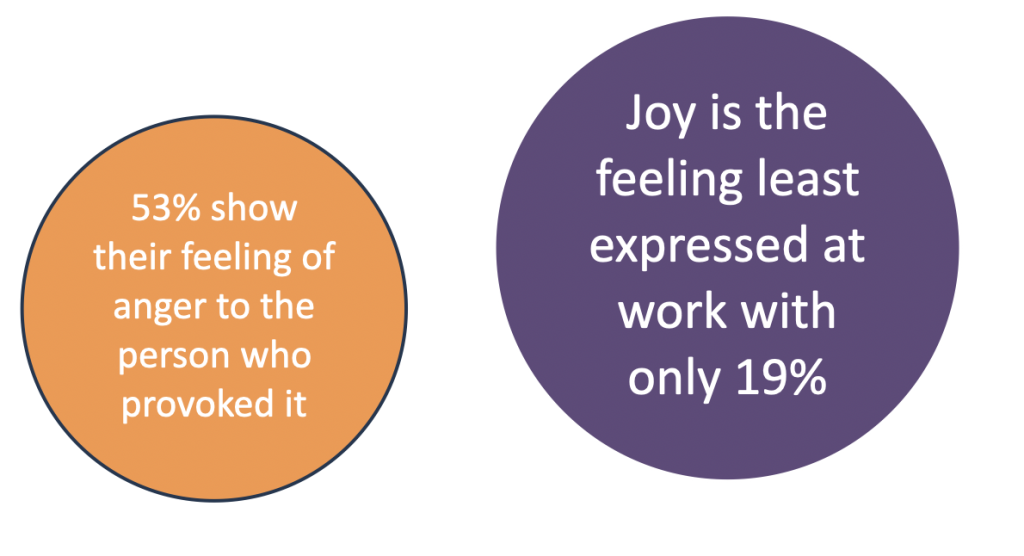This article is about the hidden pitfalls of being a purely data-driven leader and why relying solely on numbers can lead to poor decision-making. While data is valuable, true leadership also requires emotional intelligence (EQ) and cultural intelligence (CQ) to interpret and apply insights effectively. Without these skills, leaders risk becoming rigid, disconnected, and unable to inspire their teams.
This is where Gugin excels as the best partner for emotional intelligence training. We help leaders balance data with human insight, enabling them to navigate cultural complexities, build trust, and foster engagement. Our highly interactive workshops ensure that leaders develop the emotional and cultural awareness needed to make better, people-centred decisions. Because success isn’t just about data—it’s about people. Ready to transform your leadership?
In many cultures, there is a prevailing bias that expressing emotions is perceived as a sign of weakness, whereas presenting arguments backed by facts and data is seen as more credible and reliable.
This likely explains why many individuals proudly emphasize being “data-driven” or “facts-driven”—as a way to signal that their reasoning is unaffected by emotions, which are often regarded as a vulnerability. Those who base their arguments on emotions are generally viewed as less trustworthy.
As a result, if something cannot be quantified or represented in a spreadsheet, it is often dismissed as unreliable..
Here are some LinkedIn profiles outlining that they are data-driven.

With the examples above I am not trying to patronise anyone. I am merely trying to underpin a trend that is quite unfortunate.
Where is it perceived as a weakness in showing emotions?
The perception that showing emotions is a sign of weakness is more common in cultures that prioritise stoicism, rationality, and individual resilience. Below are some common cultural contexts where emotional restraint is often valued according to some management literature.
Gugin opposes these stereotypes because your relationship with emotions is dependent on a lot more than just your nationality and geographical location.

But here are the common stereotypes that some data-driven people tend to use:
1. Western Business & Scientific Cultures
• United States & UK (Corporate & Academic Settings): In professional environments, especially in fields like finance, law, and STEM, emotions are often seen as irrational or unprofessional. Leaders are expected to be data-driven and objective.
• Germany & Scandinavia: These cultures emphasise pragmatism, structure, and rational decision-making, often valuing logic over emotional expression in professional and public discourse.
2. East Asian Cultures (Confucian & Collectivist Societies)
• Japan, China, South Korea: In Confucian-influenced societies, emotional restraint is associated with discipline and social harmony. Public displays of emotion, especially in leadership or decision-making, may be seen as a lack of self-control.
3. Military & Law Enforcement Cultures
• Across various countries, military and law enforcement institutions emphasize emotional detachment as a sign of strength, discipline, and leadership under pressure.
4. Certain Masculine-Value-Oriented Cultures
• Russia & Eastern Europe: Strength and resilience are highly valued, and emotional expression—especially for men—is sometimes perceived as a weakness.
• Latin America & Southern Europe (In Some Contexts): While emotions are openly expressed in social interactions, in leadership or in professional settings, emotional restraint can still be associated with authority and reliability.
However, these perceptions are changing, especially with evolving leadership models that value emotional intelligence and authenticity. Would you like me to focus on a specific cultural context?
So why aren't these stereotypes valid?
These stereotype perceptions are changing due to several societal, psychological, and economic shifts that emphasize the value of emotional intelligence, authenticity, and well-being. Here’s why:
1. Rise of Emotional Intelligence (EQ) and cultural intelligence (CQ) in Leadership & Workplaces
• Research shows that emotionally intelligent leaders—those who recognize and manage their emotions effectively—are more successful in motivating teams, resolving conflicts, and making strategic decisions.
• Companies now prioritise soft skills like empathy, communication, and adaptability over purely analytical or authoritarian leadership styles.
2. Mental Health Awareness & Well-being Movements
• In many cultures, mental health awareness has reduced the stigma around expressing emotions. Suppressing emotions is now seen as harmful rather than a sign of strength.
• Organizations are recognizing that burnout and stress caused by emotional suppression can reduce productivity, increase turnover, and harm innovation.
3. Changing Workplace Culture & Generational Shifts
• Younger generations (Millennials & Gen Z) prioritize authenticity, emotional openness, and work-life balance. They expect workplaces to be inclusive and supportive, rather than purely results-driven.
• Remote work and hybrid models have made emotional well-being a key factor in employee engagement and retention.
4. Neuroscience & Psychological Research
• Studies in cognitive science and behavioural psychology have shown that emotions play a crucial role in decision-making, creativity, and collaboration.
• The idea that emotions interfere with rationality is outdated; instead, emotions and logic work together to shape judgment and innovation.
5. Cultural Shifts in Media & Social Norms
• Modern storytelling in media, leadership books, and pop culture highlights the strength of vulnerability (e.g., Brené Brown’s research on leadership and vulnerability).
• Social media has created a space where leaders and public figures are expected to show transparency and authenticity, making emotional openness more accepted.
6. Diversity, Equity & Inclusion (DEI) Initiatives
• Workplaces and institutions are recognising that different cultural expressions of emotion should be respected rather than suppressed.
• Traditional corporate norms (often influenced by Western, masculine-coded professionalism) are evolving to embrace emotional diversity.
7. The Rise of Purpose-Driven Leadership
• Employees, consumers, and investors now expect leaders to stand for values, not just profits.
• Leaders who show genuine passion, concern, and empathy are more likely to gain trust and loyalty from stakeholders.
Conclusion:
The old stereotype that emotional expression is a weakness is fading. Instead, emotional intelligence, cultural intelligence. authenticity and self-awareness are now seen as critical assets in leadership, relationships, and innovation.
Emotions carry a lot of data. Understanding it requires emotional intelligence
Emotions are important signals about people, social situations and interactions.
Psychologist Paul Ekman believes emotions evolved to ensure our survival by helping us work together. To me that makes a lot of sense. Computers can't fall in love - can't they?

We can try to ignore emotions, but it doesn’t work
- Emotions are contagious. Your emotions affect the group you are in.
- Psychologist Roy Baumeister found that when we suppress the expression of emotions, we remember less
- The emotionally intelligent manager uses the power of emotion to a successful, productive outcome
- Both positive and negative emotions are sources of energy when used by the emotionally intelligent manager and group.
We can try to hide emotions, but we are not as good as we think
- Emotional labour - Showing the expression that the employer demands. For example: Service people have to be positive and smiling at all times, no matter how they are feeling
- It can have huge consequences like burnout, and high job turnover among other issues when you need to put on an emotional facade
- But we do show some feelings

Let Gugin upgrade your organisation with cultural and emotional intelligence skills so you focus broader than being data-driven
Gugin has trained and developed modern leaders over the past 25 years. Here is what you get out of your investment

1. Stronger Leadership & Decision-Making
✅ Better Crisis Management: Leaders with high EQ remain calm under pressure, make rational decisions, and support teams during uncertainty.
✅ Balanced Decision-Making: Emotional intelligence helps leaders combine logic with empathy, leading to better judgment and stronger stakeholder relationships.
✅ Adaptive Leadership: CQ ensures leaders can navigate diverse cultural expectations, making them effective in global organizations.
2. Higher Employee Engagement & Retention
✅ Boosts Motivation: Employees feel valued, understood, and connected, reducing burnout and increasing job satisfaction.
✅ Reduces Turnover: A culture that prioritises emotional intelligence and respect for cultural diversity improves loyalty and reduces costly turnover.
✅ Encourages Psychological Safety: Employees are more likely to voice ideas and take initiative when they feel safe expressing emotions and perspectives.
3. Enhanced Team Collaboration & Productivity
✅ Stronger Communication: EQ improves interpersonal communication, reducing misunderstandings and workplace conflicts.
✅ Cross-Cultural Synergy: CQ helps multinational teams adapt to different communication styles and cultural norms, avoiding misinterpretations.
✅ More Inclusive Work Environment: Employees from diverse backgrounds feel respected, leading to higher collaboration and knowledge-sharing.
4. Increased Customer Satisfaction & Brand Loyalty
✅ Better Customer Understanding: Companies with high EQ and CQ understand customer emotions and cultural preferences, leading to more personalized experiences.
✅ Stronger Brand Trust: Emotionally intelligent companies create authentic brand stories, fostering deeper customer relationships.
✅ Higher Customer Retention: When customers feel valued and respected, they stay loyal to the brand.
5. More Innovation & Competitive Advantage
✅ Encourages Diverse Thinking: Culturally intelligent organizations embrace different perspectives, leading to more innovative solutions.
✅ Fosters Creativity: Employees in psychologically safe environments experiment more and take creative risks.
✅ Drives Market Adaptability: Companies with CQ adapt faster to global trends and avoid cultural missteps when expanding internationally.
Final Thoughts: Why Organisations Must Prioritise EQ & CQ
🔹 In today’s fast-changing business world, data alone isn’t enough—organizations that combine rational intelligence with emotional and cultural intelligence outperform their competitors.
🔹 Leaders who embrace EQ and CQ create workplaces where employees thrive, customers stay loyal, and innovation flourishes.
🔹 Upgrading organizations with EQ & CQ is not just a “soft skill” initiative—it’s a strategic necessity for long-term success.
